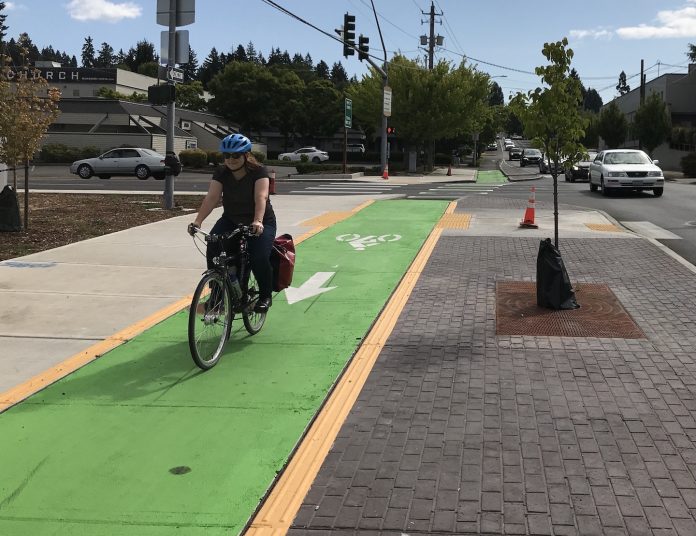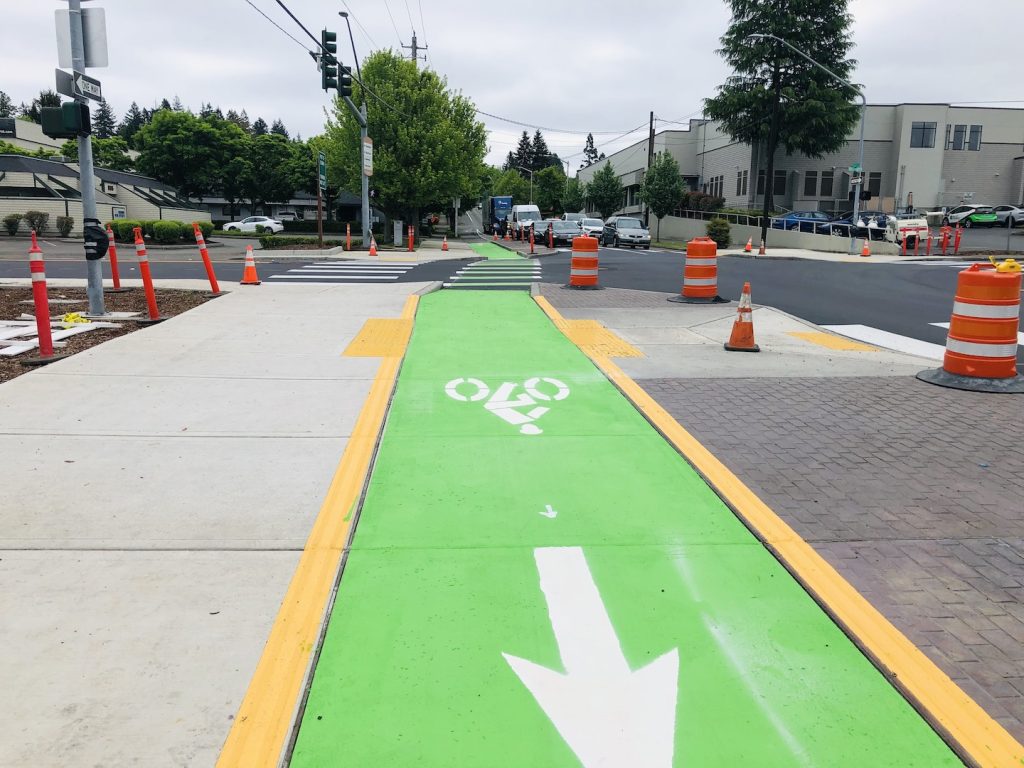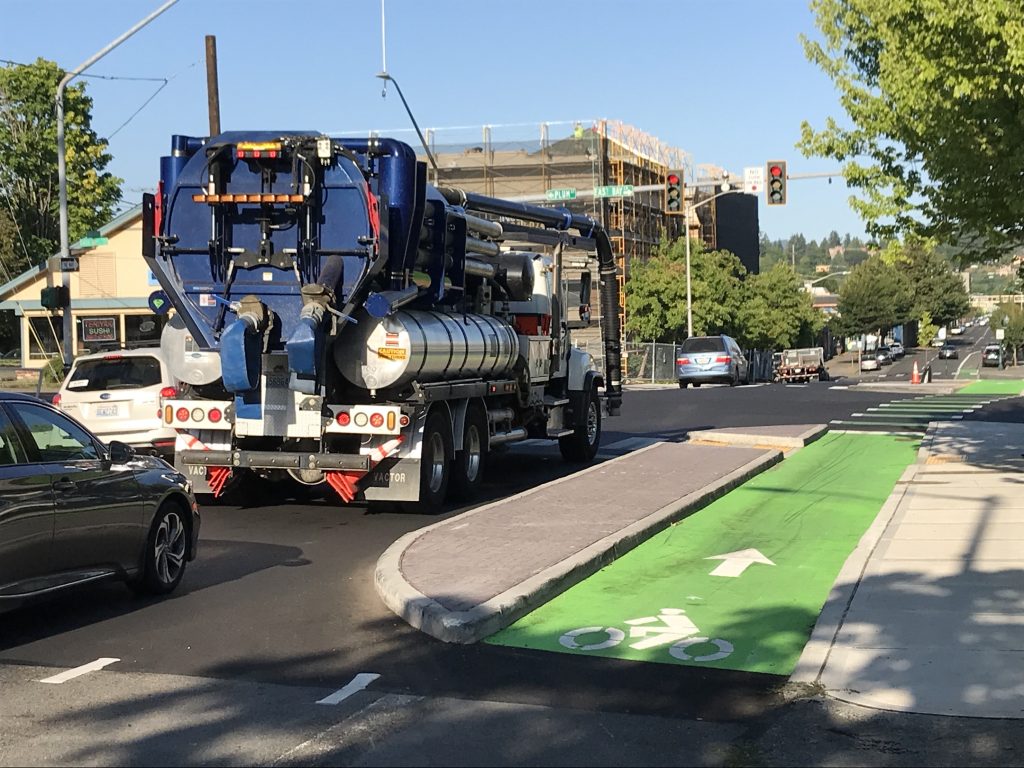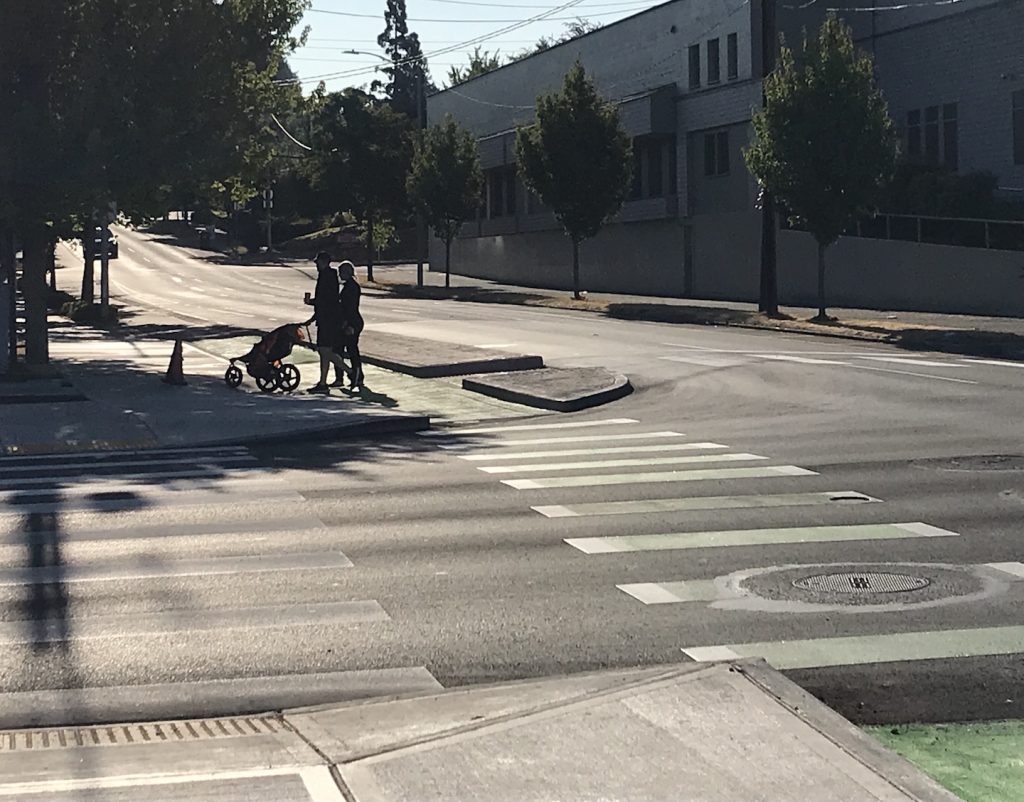
Bicycle lanes are a common element of construction projects to improve or create new roads, often separated from motor vehicle lanes by a painted white line and the occasional illustration of a bike. While markings do improve safety for cyclists, the City of Olympia is taking this up a few notches at the intersection of State Avenue and East Bay Drive with a lime green crossing that moves riders away from cars and trucks.
The crossing has changed the dynamic of the intersection. One of the three car lanes on State Avenue, a westbound-only road, has been replaced with a small concrete island called a bulb-out that makes a barrier between the bike lane and the road. This also benefits pedestrians because they now have a shorter distance to cross the road.
Cyclists, once across the intersection, are moved onto a 6-foot-wide lane that is set 12 feet away from the road. The brightly colored lane stretches for nearly a full block before riders are returned to a 5-foot-wide bike lane in the roadway. The goal is to give bike riders additional protection while crossing the intersection that has had the highest number of accidents involving motor vehicles and cyclists or pedestrians: eight between 2014 and 2018, none fatal, according to Olympia’s 2020 Street Safety Plan.
“One of my colleagues, someone who I just adore, got hit in this intersection,” says Michelle Swanson, Olympia’s Public Works Transportation senior planner. “This is the kind of stuff, you know, that really does keep you awake at night and I’m going to sleep better because of this.”

Swanson, a cyclist herself, explains that the intersection was also redesigned so that drivers have to make a sharper turn to move from State Avenue onto northbound East Bay Drive. She said drivers tend to go slower when making sharp turns. “We were comfortable with the trade-off at State and East Bay. There may be a little bit more congestion for drivers but the safety benefits for vulnerable users of the street are significant.”
Cyclist Dan Auerbach, pausing in the separated lane, says he likes the road redo. “I feel like it’s an improvement,” he explains, “especially with my kids.”
Study Shows Enhanced Bicycle Lanes Decrease Crashes
Green bike lanes are far more than a just a bit of color on the pavement. A nation-wide study from the Federal Highway Administration shows cities that used green lanes saw decreases in annual crashes. It added that these lanes also benefit pedestrians because drivers who are looking out for cyclists were more likely to spot walkers as well.
Similarly, the National Association of City Transportation Officials says the bright lanes make riders and drivers pay more attention to each other, make people more comfortable riding on busier roads and even decrease the amount of illegal parking in bike lanes.

Bike Lanes Are Good Returns on Investment
The new crossing is part of a $1.7 million project to improve bicyclist and pedestrian safety, the bulk of which was funded by a grant from the Washington Department of Transportation. Some say such projects are well worth the money and not just because these keep cyclists safer.
“The data show that when you add bike lanes, home values increase, businesses in those neighborhoods become more profitable because you can fit 20 bikes in the space of one car … air quality improves due to less pollution from car exhaust, traffic congestion decreases,” says Paul Tolmè, content strategy and media relations manager of Seattle-based Cascade Bicycle Club, self-described as the country’s biggest state-wide bicycling nonprofit.

More Bicycle Safety Projects Ahead
More bicycle safety projects will be on the way in 2024. One will be a similar crossing at the intersection of Fourth Avenue and Plum Street – a block south of this one. It has the city’s second highest number of bicycle and pedestrian accidents.
Michelle Swanson says next year’s biggest safe cycling project will be on Fones Road Southeast. It’s a half-mile stretch between 18th Avenue Southeast and the Karen Fraser Woodland Trail. The road needs more capacity, lacks bike lanes or any significant shoulders and also lacks sidewalks in some spots.
Swanson is a realist when it comes to the effects of these projects, admitting that several more safety projects will be needed in the years ahead before the city sees a significant increase in bicycle traffic.
“The people who are currently riding…we are a very small percentage of the general population,” Swanson says. “There have been some national studies that show it’s maybe 8 or 9% of the population (that) is comfortable riding in a conventional bike lane and the type of infrastructure that we have right now. There’s data to indicate that there is about 60% of population who would be interested in riding a bicycle but they’re concerned about mixing it up in traffic.”

















































